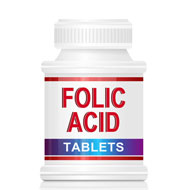- Baby care
- Baby Crying
- Baby Feeding
- Baby Growth
- Baby Language
- Baby Name
- Baby Potty Training
- Baby Safety
- Baby Shower
- Baby Sleep
- Baby Teething
- Bathing a Baby
- Early Pregnancy Signs
- Late Pregnancy
- Miscarriage
- Molar Pregnancy
- Post Pregnancy
- Postpartum Depression
- Pre Pregnancy
- pregnancy care
- Pregnancy Conditions
- Pregnancy Diet
- Pregnancy Due Date
- Pregnancy Exercise
- Pregnancy Heartburn
- Pregnancy Sex
- Pregnancy Sleep
- Pregnancy Stages
- Pregnancy Stretch Marks
- Pregnancy Style and Fashion
- Preschooler
- Second Pregnancy
- Teen Pregnancy
- Toddler Activities
- Toddler Behavior
- Toddler Discipline
- Toddler Food
- Toddler Illness and Injuries
- Toddler Speech
- Twin Pregnancy
Folic Acid During Pregnancy

Folic acid is a crucial nutrient that should be present in a pregnant woman’s diet, as its deficiency may cause the baby to be born with neural tube defects like spina bifida and anecephaly that can mean a lifetime of paralysis or retarded mental growth. In the absence of sufficient amount of this nutrient, the neural tube does not close properly and remain partly undeveloped in the brain or the spinal cord. Leading to neural disorders. Deficiency of folic acid may also lead to pregnancy-induced hypertension in mother-to-be in her second trimester. Folic acid mat even shield the growing fetus from the harmful effects of chronic illness in the mother. Folic acid, also known as folate, is a kind of B vitamin that plays an important role in cell production and division, especially of red blood cells.
Pregnant women are generally recommended to consume four doses to folic acid supplements that are commercially available. Fortified cereals and grains are also rich sources of folate. Regular consumption of this nutrient from the early stages of pregnancy is essential to ensure the normal development of the baby’s neural tube. Even women who are planning a pregnancy are advised to consume small doses of folic acid every day. The standard daily dose of folic acid for women is 0.4 milligrams. The dose may be higher (1 milligram) for pregnant women and women who are breastfeeding. Since folic acid is a water-soluble nutrient, any excess amount is automatically flushed out of the body with urine so there is no risk of an overdose. You may experience diarrhea, weight loss, exhaustion, frequent headaches, sore tongue and palpitations if you are suffering from a deficiency of folic acid.
You should include green, leafy vegetables like asparagus, turnip greens, lettuce, broccoli and spinach in your daily diet as they are among the richest natural sources of folate. Fruits of the citrus family and bananas should also be eaten at breakfast every day to keep up an adequate supply of this nutrient to the body.
Dried beans, lentils, peas, corn, oatmeal, brussel sprouts and nuts may also be eaten between meals as they have high folate content. Liver and liver products should also be eaten regularly for this purpose. Eating a bowl of cereals and a glass of orange juice is highly recommended for pregnant women, as both are rich in folic acid. Whole wheat bread, pasta or rice should be eaten at lunch or dinner.
- RSS Feeds -
- All posts
- All comments
- Folic Acid Dosage in Pregnancy Folic acid is deemed necessary for both pregnant women as well as those who w
- Pregnancy Diet And Recipes Women who are pregnant should be very particular about their diet because the
- Pregnancy Diet And Fitness Pregnancy is a time when a woman's body undergoes several changes. Apart
- Pregnancy Diet and Nutrition While pregnant, a woman has to pay special attention to her lifestyle since h